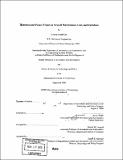Historical and future trends in aircraft performance, cost, and emissions
Author(s)
Lee, Joosung Joseph, 1974-
DownloadFull printable version (10.14Mb)
Other Contributors
Massachusetts Institute of Technology. Dept. of Aeronautics and Astronautics.
Advisor
Ian A. Waitz.
Terms of use
Metadata
Show full item recordAbstract
Air travel is continuing to experience the fastest growth among all modes of transport. Increasing total fuel consumption and the potential impacts of aircraft engine emissions on the global atmosphere have motivated the industry, scientific community, and international governments to seek various emissions reduction options. Despite the efforts to understand and mitigate the impacts of aviation emissions, it still remains uncertain whether proposed emissions reduction options are technologically and financially feasible. This thesis is the first of its kind to analyze the relationship between aircraft performance and cost, and assess aviation emissions reduction potential based on analytical and statistical models founded on a database of historical data. Technological and operational influences on aircraft fuel efficiency were first quantified utilizing the Breguet range equation. An aviation system efficiency parameter was defined, which accounts for fuel efficiency and load factor. This parameter was then correlated with direct operating cost through multivariable statistical analysis. Finally, the influence of direct operating cost on aircraft price was statistically determined. By comparing extrapolations of historical trends in aircraft technology and operations with future projections in the open literature, the fuel burn reduction potential for future aircraft systems was estimated. The economic characteristics of future aircraft systems were then determined by utilizing the technology-cost relationship developed in the thesis. Although overall system efficiency is expected to improve at a rate of 1.7% per year, it is not sufficient to counter the projected annual 4 to 6% growth in demand for air transport. Therefore, the impacts of aviation emissions on the global atmosphere are expected to continue to grow. Various policy options for aviation emissions reduction and their potential effectiveness are also discussed.
Description
Thesis (S.M.)--Massachusetts Institute of Technology, Dept. of Aeronautics and Astronautics, 2000. Includes bibliographical references (p. 141-144).
Date issued
2000Department
Massachusetts Institute of Technology. Department of Aeronautics and AstronauticsPublisher
Massachusetts Institute of Technology
Keywords
Aeronautics and Astronautics.